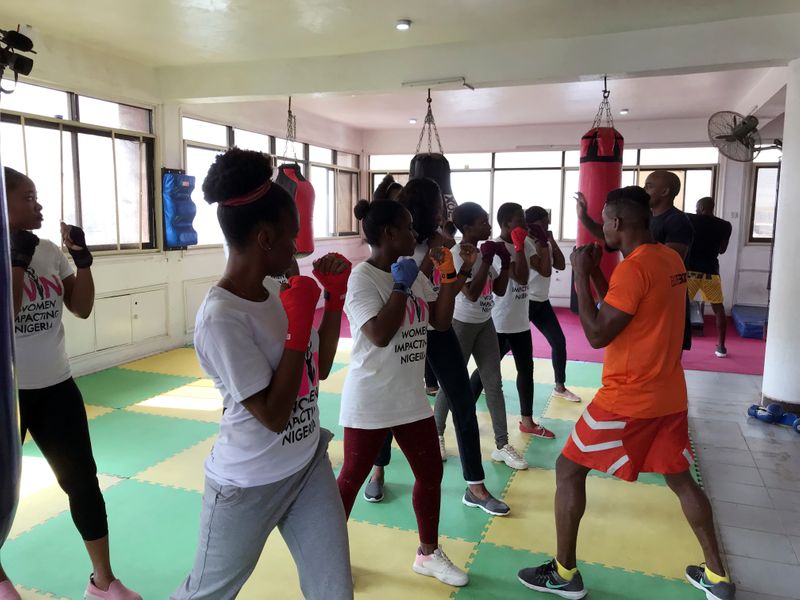By Hugh Bronstein
LAGOS, Nigeria (Reuters) - Frustrated by one of the world's highest rates of sexual assault, poor law enforcement and tribal taboos that keep people quiet about gender violence, some Nigerian women are breaking with tradition to take self-defense classes.
A local rights group and boxing coach have joined to offer free training that is tearing the lid off the largely unspoken problem of everyday violence against women in a country already well known for atrocities against girls by jihadist fighters.
New student Adeola Olamide says she was filled with fear and shame when first assaulted. When the attacks continued, the petite 35-year-old mother-of-three decided to learn techniques needed to fight off a bigger, stronger opponent.
"For us, the idea of a woman learning to defend herself is revolutionary," said Olamide, who described having been choked and beaten several times in assaults.
"As a woman in Nigeria, you're not supposed to have a voice. Every tribe has this in common."
She spoke minutes before stepping into her first class run by rights group Women Impacting Nigeria and coach Rehia Giwa-Osagie, head of local gym Elitebox.
Their hands wrapped and stuffed into boxing gloves, the students soon filled the gym with hissing sounds as they practiced jabs and uppercuts against heavy bags.
Boxing and karate instructors taught Olamide and about 20 other students basic blocking, striking and escape techniques in the two-hour class, which is offered monthly to any women willing to step out of their cultural comfort zone.
Nigerian media are awash with horrifying stories of women and girls kidnapped and trafficked for sexual and labor exploitation. And the abduction of 276 schoolgirls in 2014 by Boko Haram jihadists sparked global outcry.
But everyday assaults have stayed under the radar.
"RECLAIMING OUR DIGNITY"
Anietie Ewang, Nigeria researcher for Human Rights Watch, said law enforcement was inadequate. "When this is coupled with the negative perceptions that reinforce injustices against women, it culminates in a pretty hostile environment."
Coach Rehia said the classes were in a nascent stage but should help combat an "enormous" problem in Nigeria. Official national data on violence against women was not available, but an official at the Women's Affairs Ministry said the government was making a strong effort to combat the issue.
After her first session, Olamide's confidence grew.
"There's something about doing this with other women, reclaiming our dignity outside of a traditional therapeutic process," said the mother-of-three, still sweating. "It's different from sitting in a circle and telling our stories."
Nigeria is the ninth most dangerous country in the world for women, according to a 2018 report from the Thomson Reuters Foundation. The most dangerous was India.
"I had never heard of a women's self-defense workshop in Nigeria. It's just not done. But the #Me Too movement we've seen around the world has prompted people to ask how we can prevent violence," said Tope Imasekha, head of the rights group.
#Me Too was ignited by revelations in 2017 of assaults against women in Hollywood and became a global movement.
"Traditionally, we believe that we should be defended by men: our fathers, husbands and brothers. But with more women working and walking around independently, we need to defend ourselves," said Olamide's classmate Motunrayo Naiwo, 39.
Naiwo said she had been groped on the streets of Lagos, and seen other women accosted while men stand by watching.

"Now, with this training, even I might be able to help another woman if she's in trouble," she said.